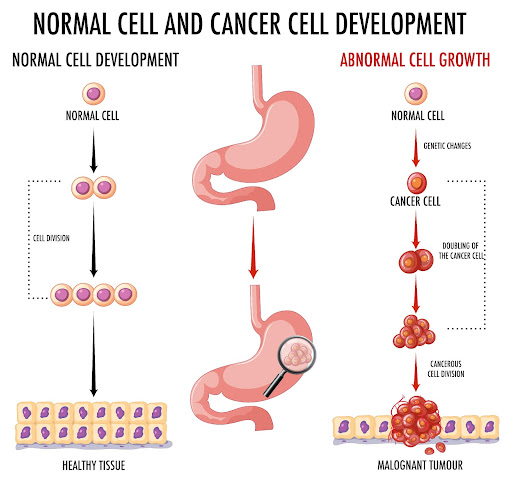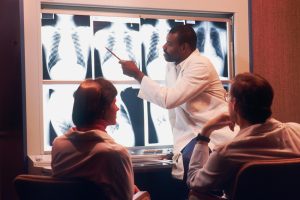Disclaimer:
This article is for information purposes only. It is not a substitute for medical advice or treatment. Seek medical care for your treatment.
What is gastric cancer?
Stomach cancer, which is also known as gastric cancer, is a development of cancer cells that forms in the inner lining of the stomach. These cells can grow into tumor. The stomach is located in the upper middle part of the belly, beneath the ribs. The stomach helps to break down and dissolve food. Stomach cancer can develop in any part of the stomach. Generally gastric cancer grows in the main part of the stomach, which is called the stomach body. This disease develops gradually over many years.
Approximately 95% times stomach cancer begins in the stomach lining. In the United States stomach cancer develops by the gastroesophagael junction, this is the part where the large tube that carries the ingested food to the stomach. The tube that transfers the food to the stomach is called esophagus. Place of cancer that begins in the stomach is one aspect that your doctor will consider while making a treatment plan. Other factors are also included like cancer stage and types of cells. Surgery is needed to eliminate the stomach cancer. Generally the gastric cancer treatment is fruitful if it is only in the stomach. The prognosis for people with small stomach cancers is really good. Many people are healed easily. Unfortunately most stomach cancers are diagnosed at an advance level and cannot be easily cured and the stomach cancer that spread through the stomach walls to the other nearby organs of the body like pancreas and liver and are really hard to cure. Stomach cancers are categorized according to the type of tissue they grow in. It is easily curable if the symptoms of stomach cancer are detected early.
Who is more likely to get stomach cancer?
Anyone can get stomach cancer. You are more likely to get it if:
- You are 65 years old or more.
- Your ethnic background is East Asian, South or Central American or Eastern European.
- You were male at birth.
Stomach cancer is one of the most frequent cancers around the world but very fewer cases are observed in the U.S., approximately 1.5% of stomach cancer cases are diagnosed every year in the U.S.
Causes of Gastric cancer:
It is not known what starts the growth of cancer cells in the stomach but experts believe that cancer begins when something hurts inside lining of the stomach. Certain things increase the chances for this disease. Common bacteria, H. pylori, is one the infections which causes ulcers. Swelling in the gut called gastritis, a certain type of prolonged anemia called pernicious anemia and growth in your stomach is called polyps are also known for causing cancer. Stomach cancer sets in when there is a genetic change in the DNA of your stomach cells. A cell’s DNA instructs the cells when to develop and when to die. The mutation tells the cells to grow rapidly and form a tumor instead of dying. The cancer cells surpass healthy cells and metastasize to other parts of the body. Researchers can’t discover the causes of mutation but certain factors that play a significant role in increasing the risk are:
- Smoking or vaping
- Obesity
- Smoky, pickled or salty foods
- Excessive alcohol drinking
- Stomach surgery for an ulcer
- Type-A blood
- Epstein-Barr virus infection
- Some genes
- Working in coal, metal, timber or rubber industries
- Asbestos exposure
- History of gastric cancer or stomach polyps
- Hereditary factors
- H. pylori infection
- Gastroesophageal reflux disease
- Gastritis
- A fruit or vegetable less diet
Symptoms of Gastric cancer:
There are no visible symptoms of gastric cancer in its early stages but in advance stage you might experience certain symptoms. If you have heartburn and indigestion problem it doesn’t mean that you have cancer, but if these symptoms happen frequently consult your doctor. In the initial stage symptoms might include indigestion or agony in the upper part of the belly. In later stages of gastric cancer you might feel fatigued, sudden weight loss, vomiting blood and passing black stools. Metastatic stomach cancer is that moves to the other parts of the body. It develops symptoms especially to where it spreads. For instance, when the cancer spreads to the lymph nodes it might create lumps which you can feel through your skin. Cancer that transfers to the liver turns eyes white and skin yellow. The cancer that reaches the belly will cause fluid to fill the belly. The belly might look bloated or swollen.
Early symptoms of stomach cancer:
- Indigestion
- Bloating after eating your meal
- Heartburn
- Nausea
- Loss of appetite
Symptoms of advance stage of gastric cancer:
- Stomach ache
- Blood in stool
- Vomiting
- Sudden weight loss
- Difficulty in swallowing
- Yellowish eyes or skin
- Inflammation in your stomach
- Diarrhea or constipation
- Fatigue
- Heartburn
Conclusion:
Gastric cancer is not always curable but, it can be treated in the beginning. Your doctor may suggest surgery to eradicate cancer cells on the basis of your cancer diagnosis. He can come up with various treatments to remove or shrink the cancer cells. Consult your doctor about the treatment options without any hesitation.




